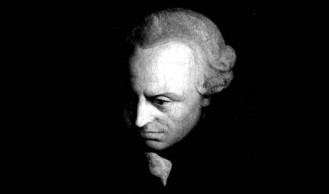In my previous post I mentioned Immanuel Kant but didn’t get around to discussing him. Over a period of twelve years, Kant, a German philosopher, developed the ideas that he would commit to writing in the now-famous work, Critique of Pure Reason (to be followed by two other “Critiques“). In part, what motivated Kant was his reaction against David Hume’s skepticism. Obviously his writings were extensive, but this post will focus on one aspect of his ideas that seems to me to be fairly straightforward.
According to Kant, there is a distinction between a thing in itself and a thing as we perceive it with our senses. As he put it, “I have no knowledge of myself as I am, but merely as I appear to myself.” The real world, the things in themselves or noumena, are perceived through our senses and that perception is a phenomenon that is distinct from the thing itself. In other words, “Though the noumenal holds the contents of the intelligible world, Kant claimed that man’s speculative reason can only know phenomena and can never penetrate to the noumenon.”The problem for Kant’s Critique of Pure Reason is very similar to the problem that we earlier identified with Hume. Kant claims he knows something about the real world, but the thing he claims to know is that human beings cannot know anything about the real world. As Geisler/Turek put it “In effect, Kant says the truth about the real world is that there are no truths about the real world.
The law of noncontradiction rears its head again. Kant cannot claim both that the real world cannot be known and that it can be known. If it’s impossible to penetrate to the thing itself with our senses, then Kant has no basis for claiming that the thing itself is truly different from the thing as it is impressed on us by our senses. If the phenomenal and the noumenal are indistinguishable, then they must be just as indistinguishable for Kant as they are for anyone else.



Great article. I agree that there is a self-contradiction in Kant as you have said. I love the philosophical discussions you’re doing here. It’s no easy task to condense the discussion and keep it clear as you are doing. I have some additional critiques against Kant, which I learned from Leonard Peikoff. Big picture: Kant is incoherent and arbitrary. #1. Incoherent: If you are seeing an object the way it appears to you, you are actually seeing the object. You are taking in information about that object. Kant’s wish to see things “as they are in themselves” is a wish to see “by not seeing.” That’s how he’s incoherent. #2. Arbitrary: The whole foundation of doubting one’s senses, embraced by Kant, Hume, and Descartes, approaches the issue in an arbitrary manner. They say, “what if my senses are deceiving me?” but they never make a positive case that the senses in fact *are deceiving us in meaningful ways. If you think railroad tracks “seem” to converge in the distance, but your senses have “deceived” you, how do you resolve the issue? You use your senses and you go further down the tracks and look for yourself. The information of senses does not lie. If there is a mistake at all, it must be in the interpretation of the data, not the data itself. All thinking does consist of taking information in by our senses and reasoning about it. There is no way to reason about anything for which there is no evidence. Ironically, that is what the skeptics are doing: They say “your senses could deceive you” but give no evidence that they *are deceiving you. To state a conclusion while giving no evidence is the definition of arbitrary.
LikeLiked by 1 person
Reblogged this on philipirrip and commented:
One of my favorite philosophers. Great article.
LikeLike